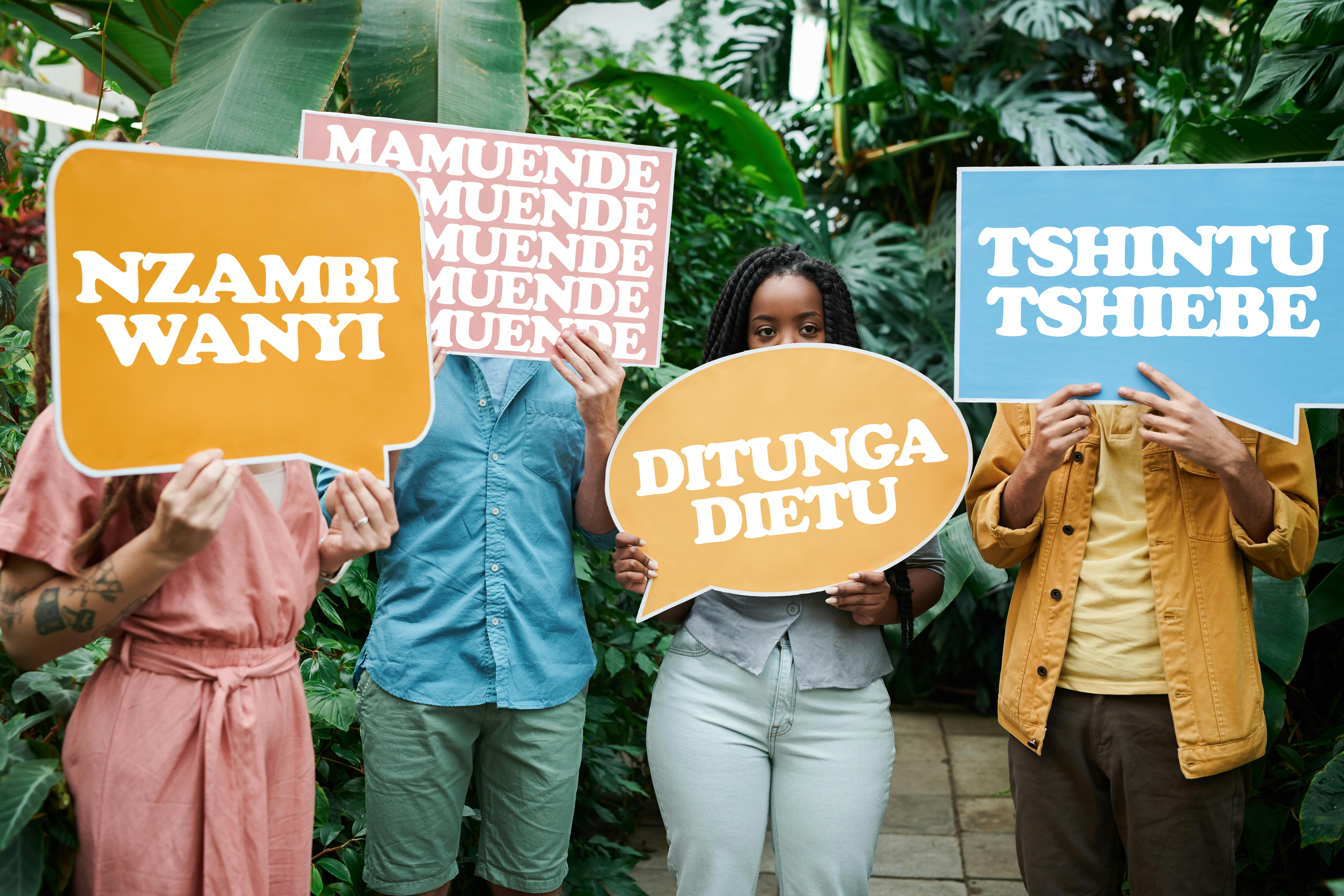Blog > Grammar > Luba Grammar: Possessive Pronouns and Adjectives

Luba Grammar: Possessive Pronouns and Adjectives
Nzambi Wanyi! Mamuanyi! Ditunga Dietu! Possessive pronouns are used so often in everday communication. In this article, we discuss the possessive pronouns and adjectives in Tshiluba and how they are used.
Lire En Français
 A group of people holding signs in Tshiluba: Nzambi Wanyi, Mamuende, Ditunga Dietu, Tshintu Tshiebe.
A group of people holding signs in Tshiluba: Nzambi Wanyi, Mamuende, Ditunga Dietu, Tshintu Tshiebe.
Possessive pronouns and adjectives are crucial in language for several reasons. They indicate ownership or association, making it clear who something belongs to, which is essential for effective communication. By providing clarity and precision, they help avoid ambiguity and confusion.
For instance, saying "her book" immediately tells us who owns the book without additional explanation. These pronouns and adjectives also contribute to conciseness, allowing us to replace longer possessive phrases with simpler forms, such as using "his" instead of "the book of John." They establish relationships between people and objects, enhancing our understanding of connections and belonging.
In prefixal languages, possessive pronouns and adjectives are typically integrated directly into the nouns they modify through the use of prefixes, which contrasts with the separate possessive pronouns and adjectives used in English or French. In Tshiluba, instead of placing a distinct word before a noun to indicate possession, Tshiluba places a word after a noun including a modifer on the word in order to link the word to the noun.
For instance, "her book" in Tshiluba is "mukanda wende." Also "her thing" in Tshiluba is "tshintu tshiende." The possessive pronouns used here are different distinct words "wende" and "tshiende." The prefix "tshi-" in "tshiende" links the possession of the pronoun to the noun "tshintu." Possessive pronouns match the prefixes of the noun it refrences.
Possessive Pronouns
Possessive pronouns in Tshiluba are formed using suffix endings. Below is a table of the suffix endings for 1st, 2nd, and 3rd person possessive pronouns. The possessive pronouns in the 3rd person are discussed in the next section.
| Possessive Pronouns | ||
|---|---|---|
| 1st | my | --anyi |
| 2nd | your | --ebe |
| 3rd | his, her | --ende |
| Plural | ||
| 1st | our | --etu |
| 2nd | your | --enu |
| 3rd | their | --abu |
TABLE 1
Each possessive pronoun is linked to the noun by using a combination of a preposition and the possessive pronoun suffix. For example, we want to say "my friend" in Tshiluba, which is "mulunda wanyi". Here is the format:
NOUN + PREPOSITION + POSSESSIVE PRONOUN SUFFIX
MULUNDA : friend (NOUN)
WA : of (PREPOSITION)
--ANYI : mine (POSSESSIVE PRONOUN SUFFIX)
(MULUNDA) + (WA) + (--ANYI)
MULUNDA WANYI
In Tshiluba, the linking preposition must show agreement with the respective noun. Below is a table of each noun class preposition:
| Noun Class Possessive Preposition | ||
|---|---|---|
| Class | Singular | Plural |
| 1. mu-ba | wa | ba |
| 2. mu-mi | wa | ya |
| 3. bu-ma | bua | a |
| 4. di-ma | dia | a |
| 5. lu-n | lua | ya |
| 6. n-n | wa | ya |
| 7. ka-tu | ka | tua |
| 8. tshi-bi | tshia | bia |
TABLE 2
Refer to Exploring the Noun Class System in Tshiluba for more information about the 8 Luba noun classes. Here are more examples of possessive pronoun and preposition agreement for each noun class.
MU-BA
mulunda wanyi : my friend
balunda banyi : my friends
MU-MI
mukoko webe : your sheep
mikoko yebe : your sheep (plural)
BU-MA
budimi buenu : your field (plural)
madimi enu :your fields (plural)
(a) + (--enu) : enu
DI-MA
difuma diabu : their spear
mafuma abu : their spears
LU-N
lukasu luetu : our hoe
nkasu yetu : our hoes
(ya) + (--etu) : yetu
KA-TU
kasuyi ketu : our little axe
tusuyi tuetu : our little axes
TSHI-BI
tshilulu tshianyi : my pagne
bilulu bianyi : my pagnes
Noun Class Respective Possessive Pronouns
In this section, we will cover possessive pronouns for the 8 noun classes in the 3rd person. In Tshiluba, the 3rd person possessive pronoun is represented by "--ende", which is both "his" and "hers". However, for animals or inanimate objects, the possessive personal pronoun must correspond to the noun class it makes a reference to. For example:
"An eagle and it's wings"
It is incorrect to say:
"Tshiminyi ne mapuapua ende"
We say instead:
"Tshiminyi ne mapuapua atshi"
Below is a table of the possessive pronouns corresponding to each 3rd person noun class, these pronouns correspond to the various "it" pronouns representing different classes of inanimate objects or animals.
| Noun Class Possessive Pronouns | ||
|---|---|---|
| Class | Singular | Plural |
| 1. mu-ba | --ende | --abu |
| 2. mu-mi | --awu | --ayi |
| 3. bu-ma | --abu | --awu |
| 4. di-ma | --adi | --awu |
| 5. lu-n | --alu | --ayi |
| 6. n-n | --ende | --ayi |
| 7. ka-tu | --aku | --atu |
| 8. tshi-bi | --atshi | --abi |
TABLE 3
Here are more examples of possessive pronoun and preposition agreement for each noun class.
MU-BA
mukalenge ne bena mudimu bende : the king and his servants
bakalenge ne bena mudimu babu : the kings and their servants
MU-MI
mutshi ne matamba awu : a tree and its branches
mitshi ne matamba ayi : the trees and their branches
BU-MA
budimi ne matala abu : a farm and its maize
madimi ne matala awu : the farms and their maize
DI-MA
dibata ne muinu wadi : a duck and its bill
mabata ne minu yawu : the ducks and their bills
LU-N
lupingu ne tshianza tshialu : a statue and its hand
mpingu ne bianza biayi : the statues and their hands
N-N
Nyunyu ne dipuapua diende : a bird and its wing
nyunyu ne mapuapua ayi : the birds and their wings
KA-TU
Kalulu ne ditshi diaku : a bunny and its ear
Tululu ne matshi atu : the bunnies and their ears
TSHI-BI
Tshiminyi ne muinu watshi : an eagle and its beak
Biminyi ne minu yabi : the eagles and their beaks
There are different forms of Tshiluba existing throughout Kasai, and the possessive pronoun rules are used in some areas, but other areas subscribe to different rules. These differences are enough for the Luba language to be lost and abandoned due to regional preference and disunity. With more articles like this one, TSHILUBA.co aims to bring linguistic unity and cohesion in order to preserve and protect the next generation of lubaphones.



